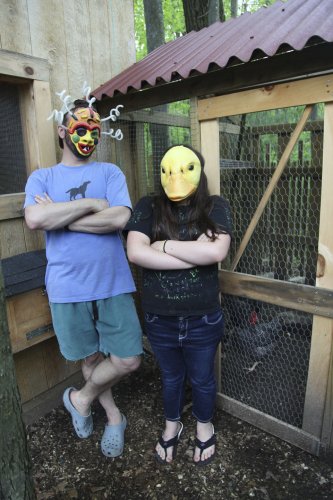There are chickens among us, clucking away in back yards across the city.
Raising backyard fowl is all the rage these days, as part of a growing localvore movement that encourages people to eat more locally and sustainably. But in Concord, there's a problem: Some of the birds are being kept illegally, in defiance of city zoning laws, which require homeowners to have sufficient acreage to raise the birds. That rule is ruffling the feathers of some chicken-enthusiasts, who say the ordinance is too strict and should be updated.
Under the current ordinance, people can't keeping chickens unless they own at least one acre of land, said Craig Walker, the city's zoning administrator. There are two different categories in keeping of poultry or livestock: one is commercial, meaning a farm; the other is accessory, or keeping chickens as pets, which is allowed in residential areas provided there's enough land to meet the requirements.
With an acre, residents are allowed to keep as many as five chickens. Each additional fowl requires an additional one-fifth of an acre. The birds are not permitted to roam free, Walker said, and the coop cannot be located within 50 feet of any lot line. Roosters are strictly prohibited.
Some residents, like Stacey Brown, say that the rules are too tough, so she's lobbying the city council to have them changed.
Brown grew up on a gentleman's farm in southern New Hampshire, with chickens aplenty. She thinks the birds need far less than an acre to thrive. Last month, she wrote to Mayor Jim Bouley and City Councilor Amanda Grady requesting that the city council change the ordinance, though she didn't specify what the exact boundaries should be, she said.
“Having grown up with chickens, I know that they're incredibly easy and very low maintenance,” said Brown, who lives within five blocks of the State House. “I'd like to change (the ordinance) so there could be a little group and community of people who have backyard chickens.”
A neighborhood attraction
One Concord resident, who we'll refer to as “Clucky” and will remain anonymous because he is illegally raising chickens on less than an acre, has four fowl in his back yard. Clucky and his wife looked at the ordinance online and didn't notice the one-acre restriction, so they purchased six chickens last summer (two have since perished) at the request of their daughters, who wanted to raise the birds as pets, and for eggs. The remaining birds – Artemis, Aphrodite, Persephone and Athena – live in a creme-de-la-creme coop referred to as the “poultry palace” in the family's back yard.
The birds produce about two dozens eggs a week, enough for the family's consumption, Clucky said, adding that it's been fun having them around. “They've become sort of an attraction in the neighborhood,” he said. “All the kids come over and want to see them.”
Initial concerns about the noise and smell haven't been an issue, Clucky said, and neighbors haven't minded a little squawking.
“They're nowhere near as noisy or stinky as the dog,” Clucky said, “and they eat all the weeds.”
Chicken bandits
Walker, the zoning administrator, said there's definitely been an increase of residents who've approached him in the past three years asking about the rules. Walker is not opposed to having the ordindance changed. In fact, he's been looking into how other cities, like South Portland, Maine, have modified their own laws to allow chickens on smaller plots. (In Portland, the ordinance was changed by a 10-year-old girl – proof that pretty much anyone can do it, Walker said.)
“There seems to be a significant interest out there, and we're trying to look at what we can put in the ordinance. We're asking 'Is one acre too restrictive? What are the land requirements other communities are using?' It definitely varies,” Walker said.
Under the current rules, if someone wants to raise chickens on less than an acre, they can apply to the zoning board for a variance. That costs anywhere from about $350 to $430. The fine for raising chickens illegally (a violation that no one is Concord has been caught for yet, Walker said), is about $200. Hunting down chicken bandits isn't exactly a top priority for the city either, Walker said.
“We haven't had many complaints. I had one a few years ago, in the South End: Someone's chicken was running down the middle of the street. You know, we had to look into that one,” Walker said. “We've had others that were being raised illegally in the back yard, hopping into the neighbors yard and causing problems.”
Getting a new ordinance adopted would require someone to draft one up and submit it to the council. Then it would go to the planning board for review, and finally be open to public comment before councilors made a decision.
Grady, who received Brown's request to change the ordinance, said she expects the city council to take up the issue next month. She's not sure how things will play out.
“I do understand that there have been several requests in the past that usually arrive during Easter time,” Grady said. “One consistuent I've spoken with feels chickens are noisy, and has concerns about . . . the smell.”
It's what's for dinner
Whatever the council decides, there's still the question that all chicken owners must decide when their pets get up in years: What to do when the birds no longer lay. Chickens are most productive their first four years of life, and Clucky's family isn't sure what will happen when that day comes. Will they become dinner?
Clucky's daughter, we'll call her Eggy, has one piece of advice for would-be poultry farmers: “If you get chickens, don't name them,” she said. “If you name them, they become your pets. I can't think about eating my pets.”










